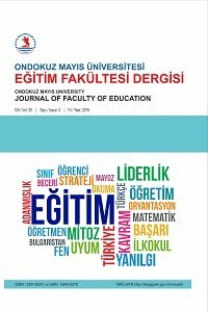Sınıf öğretmeni adaylarının iyi öğretmen olma ile ilgili görüşleri
Bu çalışma, sınıf öğretmeni adaylarının iyi öğretmen olma ile ilgili görüşlerini araştıran nitel bir çalışmadır. Gazi Üniversitesinde ikinci öğretimde okumakta olan 109 3.sınıf öğretmen adayına açık uçlu bir soru yanıtlanmak üzere verilmiştir. İyi öğretmen olma ile ilgili görüşler kişisel karakteristikler, konu ve konu anlatımına hakimlik, beceriler, profesyonel gelişim, takdir edilme ve görev yükümlülüğü başlıkları altında toplanmış olmasına rağmen verilen yanıtların çoğunluğu kişisel karakteristiklerin farklı boyutları altında toplanmıştır.
Primary teachers candidates' views on good teacher
The aim of this study was to examine qualitatively 109 third year primary teacher candidates’ views on being a good teacher. One open-ended question was posed to teacher candidates to be answered in writing. Although opinions about being a good teacher were categorized into six subtitles: personal characteristics, knowledge of subject and its teaching;, skills, professional growth, appreciation, and commitment to the mission, most of the answers were about different dimensions of personal characteristics.
___
- Akyüz, Y. (1978). Türkiye deki öğretmenlerin toplumsal değişmedeki etkileri. Ankara: Doğan Basımevi.
- Berliner, D. (1987a). Simple views of effective teaching and a simple theory of classroom instruction. D. C. Berliner ve B. V. Rosenshine (Eds.), Talks to Teacher. New York: Random House.
- Berliner, D. C. (1987b). But do they understand? Richardson-Koehler (Ed.), Educator’s handbook: A research perspective. New York: Longman
- Brophy, J.E., & Alleman, J. (1991). Activities as instructional tools: A framework for analysis and evaluation. Educational Researcher, 20(4), 9-23.
- Cobb , P., & McClain, K. (1999). Supporting teachers’ learning in social and institutional contexts. In Fou-Lai Lin (Ed.), Proceedings of the 1999 International Conference on Mathematics Teacher Education (7-77). Taipei: National Taiwan Normal University
- Cruickshank, D., Bainer D., & Metcalf. K. (1995). The act of teaching. Mcgraw-Hill, Inc.
- Cruickshank, D.R., & Heafele, D. (2001). Good teachers, plural. Educational Leadership, 58(2), 26-30.
- Ekiz, D. (2003). Sınıf öğretmeni adaylarının öğretmen eğitimindeki modeller hakkında düşünceleri. Milli Eğitim, 158, 146-160.
- Evertson, C., Andarson, L., & Brophy, J. (1978). Texas junior high school study: final report of process outcome relationship (Vol.1. Report No. 4061). Research and Development Center for Teacher Education, University of Texas.
- Göksugüzel, L. (2000). Öğretmen yetiştirmede sosyal beceri eğitiminde rehberlik. II. Ulusal Öğretmen Yetiştirme Sempozyumu (581-583), Çanakkale.
- Hamachek, D. (1995). Psychology in teaching, learning and growth. Mass: Allyn and Bacon.
- Hidget, G. (1957). The art of teaching. New York: Vintage Books
- Kane, P. R., & Temple, E. (1997). Who is a good teacher? who is a good school head? Independent School, 56(3), 50-57.
- Kavcar, C. (1999). Nitelikli öğretmen sorunu. Eğitimde yansımalar V. 21. Yüzyılın Eşiğinde Eğitim Sistemi Ulusal Sempozyumu. Ankara.
- Kızıltepe, Z. (2002). İyi ve etkili öğretmen. Eğitim ve Bilim, 27, 10-14.
- McDonald, F. (1975). Research on teaching and its implications for policy making: Report on phase II of the beginning teachers evaluation study. Princeton, NJ: Educational Testing Service.
- Milli Eğitim Bakanlığı Öğretmen Yetiştirme ve Eğitim Genel Müdürlüğü. (2006). Öğretmenlik mesleği genel yeterlilikleri. Temel Eğitime Destek Projesi “Öğretmen Eğitimi Bileşeni”.
- Murray, H. G. (1983). Low inference classroom teaching behavior and student ratings of college teaching effectiveness. Journal of Educational Psychology, 75, 138-149.
- Porter, A.C., & Brophy, J.E. (1987). Good teaching: Insights from work of the Institute for Research on Teaching. Occasional PAPER No.114, East Lansing: The Institute for Research on Teaching, Collage of Education, Michigan State University.
- Rosenshine, B., & Furst, N. (1973). The use of direct observation to study teaching. In R. Travers (Ed.), Second Handbook of Research on Teaching. Chicago: Rand Mcnally.
- Ryans, D.G. (1960). Characteristics of effective teachers, their descriptions, comparisons and appraisal: A research study. Washington DC: American Council on Education.
- Sherman, B.R., & Blaackman, R.T. (1975). Personal characteristics and teaching effectiveness of college faculty. Journal of Educational Psychology, 67, 124-131
- Sanders, S. E. (2002). What do schools think makes a good mathematics teacher? Educational Studies, 28(2), 181-191.
- Shulman, L. S. (1987). Knowledge and teaching: Foundations of the new reform. Harward Educational Review, 57(1), 1-22.
- Soar, R. S., & Soar, R. M. (1978). Setting variables, classroom interaction, and multiple outcomes. Final Report for National Institute of Education, Project No.6-0432. Gainesville, University of Florida.
- Stallings, J., & Hentzell, S. (1978). Effective teaching and learning in urban schools. Paper presented at the National Conference on Urban Schools, St. Louis, Missouri.
- Sullivan, P., & McDonough, A. (2002). Teachers differ in their effectiveness. Proceedings of the 26th Annual Conference on Psychology of Mathematics Education (vol.4, s.249-255).
- Yetim, A. A., & Göktaş, Z. (2000). Öğretmenin mesleki ve kişisel nitelikleri. II. Ulusal Öğretmen Yetiştirme Sempozyumu (569-573), Çanakkale.
- Woolfolf, A.E. (1990). Educational psychology. (4th ed.), Englewood Cliffs, NJ: Prentice-Hall, (622 pp.), Allyn and Bacon.
- ISSN: 1300-302X
- Yayın Aralığı: Yılda 2 Sayı
- Başlangıç: 1986
- Yayıncı: Ondokuz Mayıs Üniversitesi Eğitim Fakültesi
Sayıdaki Diğer Makaleler
A teaching strategy for developing the power of observation in science education
Kemal YÜRÜMEZOĞLU, Ayşe ÜNVER OĞUZ
Sınıf öğretmeni adaylarının iyi öğretmen olma ile ilgili görüşleri
Hasan DEMİRTAŞ, Gülcan DURMUŞ YALÇIN
İlk ve ortaöğretim okulu öğretmenlerinin özgecilik düzeyleri üzerine bir araştırma
Engin KARADAĞ, Işıl MUTAFÇILAR
